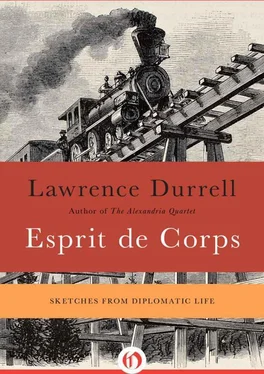Last week, Polk-Mowbray’s name came up again — we had read of his retirement that morning, in The Times . We had both served under him in Madrid and Moscow, while Antrobus himself had been on several missions headed by him — Sir Claud Polk-Mowbray, O.M., K.C.M.G., and all that sort of thing.
Talking of him, Antrobus did his usual set of facial jerks culminating in an expression like a leaky flowerpot, and said: “You know, old man, thinking of Polk-Mowbray today and all the different places we’ve served, I suddenly thought ‘My God, in Polk-Mowbray we have witnessed the gradual destruction of an Ambassador’s soul’.”
I was startled by this observation.
“I mean,” went on Antrobus, “that gradually, insidiously, the Americans got him.”
“How do you mean, ‘the Americans got him’?”
Antrobus clicked his tongue and lofted his gaze.
“Perhaps you didn’t know, perhaps you were not a Silent Witness as I was.”
“I don’t honestly think I was.”
“Do you remember Athens ’37, when I was first secretary?”
“Of course.”
“Polk-Mowbray was a perfectly normal well-balanced Englishman then. He had all the fashionable weaknesses of the eighteenth-century gentleman. He fenced, he played the recorder.”
“I remember all that.”
“But something else too. Think back.”
“I’m thinking.…”
Antrobus leaned forward and said with portentous triumph: “He wrote good English in those days.” Then he sat back and stared impressively at me down the long bony incline of his nose. He allowed the idea to soak in.
Of course what he meant by good English was the vaguely orotund and ornamental eighteenth-century stuff which was then so much in vogue. A sort of mental copperplate prose.
“I remember now,” I said, “committing the terrible sin of using the phrase ‘the present set-up’ in a draft despatch on economics.” (It came back gashed right through with the scarlet pencil which only Governors and Ambassadors are allowed to wield — and with something nasty written in the margin.)
“Ah,” said Antrobus, “so you remember that. What did he write?”
“‘The thought that members of my staff are beginning to introject American forms into the Mother Tongue has given me great pain. I am ordering Head of Chancery to instruct staff that no despatches to the Foreign Secretary should contain phrases of this nature.’”
“Phew.”
“As you say — phew.”
“But Nemesis”, said Antrobus, “was lying in wait for him, old chap. Mind you,” he added in the sort of tone which always sounds massively hypocritical to foreigners simply because it is, “mind you I’m not anti-American myself — never was, never will be. And there were some things about the old Foreign Office Prose Style — the early Nicolson type.”
“It was practically Middle English.”
“No, what I objected to was the Latin tag. Polk-Mowbray was always working one in. If possible he liked to slip one in at the beginning of a despatch. ‘Hominibus plenum, amicis vacuum as Cato says’, he would kick off. The damnable thing was that at times he would forget whether it was Cato who said it. I was supposed to know, as Head of Chancery. But I never did. My classics have always been fluffy. I used to flash to my Pears Encyclopedia or my Brewer, swearing all the time.”
“He sacked young Pollit for attributing a remark in Tacitus to Suetonius.”
“Yes. It was very alarming. I’m glad those days are over.”
“But Nemesis. What form did he take?”
“She, old man. She. Nemesis is always a woman. Polk-Mowbray was sent on a brief mission to the States in the middle of the war.”
“Ah.”
“He saw her leading a parade wrapped in the Stars and Stripes and twirling a baton. Her name was Carrie Potts. She was what is known as a majorette. I know. Don’t wince. No, he didn’t marry her. But she was a Milestone, old fellow. From then on the change came about, very gradually, very insidiously. I noticed that he dropped the Latin tag in his drafts. Then he began to leave the ‘u’ out of words like ‘colour’ and ‘valour’. Finally, and this is highly significant, he sent out a staff circular saying that any of the secretaries caught using phrases like quid pro quo, sine qua non, ad hoc, ab initio, ab ovo and status quo would be transferred. This was a bombshell. We were deprived at a blow of practically our whole official vocabulary. Moreover as he read through the circular I distinctly heard him say under his breath: ‘This will pin their ears back.’ You can imagine, old fellow, I was stiff with horror. Of course, the poor fellow is not entirely to blame; he was fighting the disease gamely enough. It was just too much for him. I found a book by Damon Runyon in his desk-drawer one day. I admit that he had the good taste to blush when he saw I’d found it. But by this time he had begun to suffer from dreadful slips of the tongue. At a cocktail party for instance he referred to me as his ‘sidekick’. I was too polite to protest but I must admit it rankled. But there was a much more serious aspect to the business. His despatches began to take a marked transpontine turn. By God, you’ll never believe it but I kept coming across expressions like ‘set-up’, ‘frame-up’, ‘come-back’, and even ‘gimmick’. I ask you— gimmick. ” Antrobus blew out his breath in a cloud of horror. “As you can imagine,” he went on after a pause, “the F.O. was troubled by the change in his reporting. Worst of all, other Ministers and Ambassadors junior to him and easily influenced showed some disposition to copy this sort of thing. Finally it got to such a pitch that all despatches before being printed in Intel-summary form had to pass through a sieve: they established an office in the Rehabilitation section specially for deformed English. Then you remember the Commission on Official English and the book called Foreign Office Prose — How to Write It? ”
“Yes. One of the worst written books I’ve ever read.”
“Well, be that as it may, it was the direct outcome of Polk-Mowbray’s activities. It was a last desperate attempt to stop the rot, old man. It was too late, of course, because by this time that dreadful Churchill chap was wandering all over the globe in a siren suit waving a Juliet at everyone. I need hardly add that Mowbray himself ordered a siren suit which he referred to as his ‘sneakers’. He used to potter round the Embassy grounds in them — a bit furtively, of course, but nevertheless … there it was.” Antrobus paused for a long moment as he sorted out these painful memories. Then he said grimly, under his breath, and with dark contempt: “Faucet, elevator, phoney. I ask you.”
“Yes,” I said.
“Hatchet-man … disc-jockey … torch-singer.”
“Yes. Yes. I follow you.”
“I was terribly sad. Poor Polk-Mowbray. Do you know that he went to a Rotary meeting in a hand-painted tie depicting a nude blonde and referred to it in his speech as ‘pulchritudinous’?”
“Never.”
“He did.” Antrobus nodded vigorously several times and took a savage swig at his drink. “He absolutely did.”
“I suppose”, I said after a moment, “that now he is retiring he will settle over there and integrate himself.”
“He was offered a chance to go to Lake Success as a specialist on Global Imponderables, but he turned it down. Said the I.Q. wasn’t high enough — whatever that meant. No, it’s even more tragic. He has taken a villa outside Rome and intends to summer in Italy. I saw him last week when I came back from the Athens Conference.”

Читать дальше













